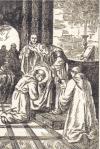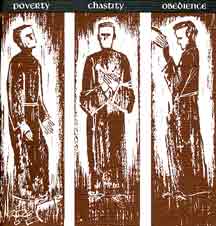
CHAPTER IV:
'THE LITTLE FLOWERS OF SAINT FRANCIS'
HOW THE ANGEL OF GOD PUT A QUESTION TO BROTHER ELIAS, GUARDIAN OF VAL DI SPOLETO, AND HOW, WHEN BROTHER ELIAS ANSWERED PROUDLY, THE ANGEL DEPARTED FROM HIM, AND TOOK THE ROAD TO SAN GIACOMO, WHERE HE MET BROTHER BERNARD AND TOLD HIM WHAT FOLLOWS
In the first beginning of the Order, when there was as yet but few brothers and no convents established, St Francis went, out of devotion, to San Giacomo di Galicia, taking with him Brother Bernard and one or two other brothers. As they travelled on together, they met by the way a poor sick man. St Francis, moved with compassion at the sight of his sufferings, said to Brother Bernard: “My son, I will that thou stay here, and take care of this sick man.” And Brother Bernard, meekly falling on his knees, received the order of his revered father and remained behind, whilst St Francis and the others proceeded to San Giacomo. On arriving there, they spent the night in prayer in the Church of St James, and God revealed to St Francis how he would found many convents all over the world, and how his Order would increase and multiply into a great multitude of brethren. After this revelation St Francis began to found convents in that country. Then returning by the way he had come, and finding Brother Bernard with the sick man, who had quite recovered, he allowed him to go the following year to San Giacomo, whilst he himself returned to Val di Spoleto, and took up his abode in a desert place with Brother Masseo, Brother Elias, and others. All these were very careful never to interrupt St Francis in his devotions; and this they did out of the great reverence they bore him, and because they knew that God revealed to him great things in prayer. Now it chanced one day, as St Francis was praying in the forest, that a handsome young man, dressed for traveling, presented himself at the convent-gate, knocking thereat so loudly, so quickly, and so long, that the brothers marvelled greatly at a way of knocking so strange and unusual. Brother Masseo, who went and opened the gate, thus addressed the young man: “Whence comest thou, my son? for the strange manner in which thou knockest makes me to think thou hast never been here before.” At this the young man asked: “How then ought I to knock?” Brother Masseo answered: “Thou shouldst give three knocks, one after the other, and then wait time enough for a brother to say an ‘Our Father,’ and come and open to thee; should he not arrive by that time, then thou mayest knock again.” “I was in great haste,” replied the stranger; “for I have made a long journey, and am come to speak with St Francis, who at this hour is praying in the forest, wherefore I would not interrupt him. I pray thee; then, to call Brother Elias; for I wish to put a question to him, having heard that he is full of wisdom.” Then Brother Masseo going, called Brother Elias; but he, being angry, refused to go, so that Brother Masseo was at a loss what answer to make the stranger. For if he told him Brother Elias could not wait on him, he would say an untruth; while if he told how he spoke in anger, he feared to give scandal. Whilst Brother Masseo was hesitating how he should act, whether or no he should return with the message, the stranger knocked again as he had knocked before. On this Brother Masseo hastened back to the convent-gate, and said reproachfully: “Thou hast not observed what I said to thee as to how thou shouldst knock.” To this the young man made answer: “Since Brother Elias will not come to me, go, tell Brother Francis that I came here to speak with him; but, not wishing to interrupt his prayers, I beg him to order Brother Elias to come to me.” Then Brother Masseo went to St Francis, who was praying in the forest with his eyes lifted up to heaven, and gave him the message of the young man, with the answer of Brother Elias. Now the young man was the angel of God, under the form of a traveller. St Francis, without moving and still looking up to heaven, said to Brother Masseo: “Go, tell Brother Elias, in virtue of holy obedience, to go and speak with that young man.” So Brother Elias, having received the order of St Francis, went to the convent-gate in an angry mood, and opening it with violence, asked of the young man what he wanted with Him. The latter answered: “Beware of being angry, as thou appearest to be; for anger woundeth the soul, preventing it from discerning the truth.” Brother Elias said again: “Tell me what thou wantest with me.” “I wish to know,” answered the stranger, “if it be permitted to such as follow the Holy Gospel to eat whatever is served before them, according to the words of Christ to his disciples; and I wish to ask thee, likewise, if it be lawful for any man to teach a doctrine contrary to the liberty preached in the Gospel.” On this Brother Elias answered proudly: “I know what answer to make thee, but I am not inclined to give thee one. Be gone about thy business.” The young man replied: “I know better than thou dost what answer to make to these questions.” Then was Brother Elias much troubled; and, being very angry, he slammed to the door, and went his way. But afterwards, considering the questions which had been put to him, he doubted within himself whether he could answer them; for being Vicar of the Order, he had made a law which went beyond that of the Gospel, and passed the Rule of St Francis: to wit, that none of the brethren should eat flesh; so that the question was put expressly against himself. Not knowing in what way to clear his doubts, and being struck by the modest appearance of the young stranger, remembering also how he had said that he could answer the questions better than himself, he hurried back to the convent-gate in hopes of finding him. But he had disappeared, for the pride of Brother Elias made him unworthy to converse with an angel. In the meantime St Francis, to whom all had been revealed by God, returning from the forest, addressed himself reproachfully to Brother Elias, saying: “Thou doest wrong, proud Brother Elias; for thou hast sent away the holy angel of God, who came to instruct us. I tell thee that I greatly fear lest thy pride will make thee end thy days out of the Order.” And so it happened even as St Francis said, for he died out of the Order. The same day and the same hour at which the angel had disappeared from the convent-gate, he appeared to Brother Bernard, who was making his way homewards from San Giacomo, along the bank of a great river. The angel, clad in the same guise as a traveller, greeted him with the words, “God give thee peace, good brother.” Now Brother Bernard, considering the beauty of the young man, who with so sweet a look pronounced the salutation of peace, according to the custom of his own country, asked of him whence he came. “I come,” answered the angel, “from the convent where dwells St Francis. I went thither to speak with him, but to do so I was not able, for he was in the forest contemplating divine things, and I would not disturb him. In the same convent were Brother Giles, and Brother Elias, with Brother Masseo, who taught me how to knock at the convent-gate according to the custom of the brethren. Brother Elias would not answer the questions I put to him; but afterwards he repented, seeking to see and hear me; but it was too late.” After these words, the angel asked Brother Bernard why he did not cross the river. “Because,” answered Brother Bernard, “I fear to perish in the waters, which are very deep.” The angel said to him, “Let us cross together; fear naught.” And, taking him by the hand, in an instant they were both on the other side of the river. Then Brother Bernard knew him for the angel of God, and with great joy and great reverence he exclaimed: “Blessed angel of God, tell me thy name.” The angel answered: “Why dost thou ask my name, which is Wonderful?” Having said these words, he disappeared, leaving Brother Bernard greatly comforted; so that he ended his journey with much joy, noting the day and the hour when the angel had appeared. On arriving at the convent, where St Francis was with his favorite companions, he related to them word for word his adventure; and they knew with a certainty that it was the very angel who, on the same day and at the same hour, had appeared to them also.
[Public Domain.]




















